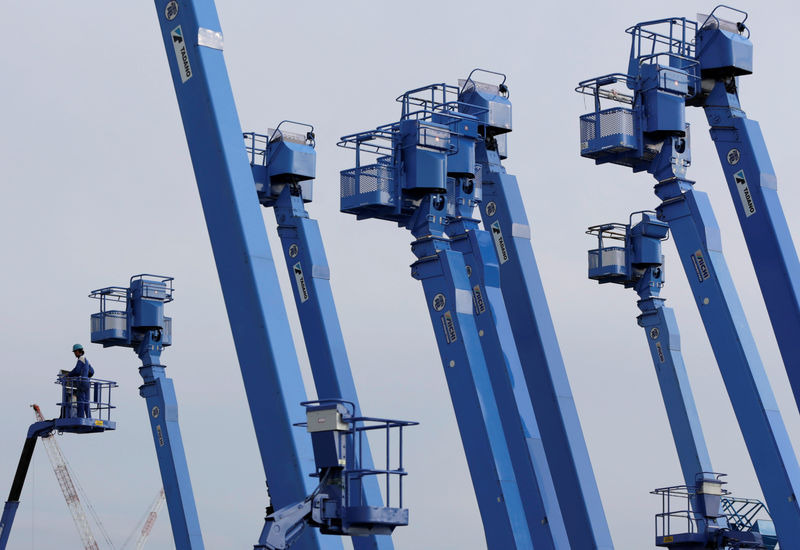 © Reuters. FILE PHOTO – Worker stands on a crane which is parked at a construction site at Keihin industrial zone in Kawasaki
© Reuters. FILE PHOTO – Worker stands on a crane which is parked at a construction site at Keihin industrial zone in KawasakiBy Stanley White
TOKYO (Reuters) – Japan’s core machinery orders rose less than expected in October following an earthquake in the previous month, pointing to more subdued business investment as earnings growth slows and as trade protectionism increases headwinds for the economy.
The 7.6 percent rise month-on-month in core machinery orders, considered a leading indicator of capital expenditure, undershot the median estimate for a 10.5 percent gain. That followed a record slide of 18.3 percent in September, when an earthquake struck northern Japan and flooding disrupted business in western parts of the nation.
The rebound in machinery orders could be short-lived as the U.S.-China trade war, Japan’s looming trade talks with the United States, and a slowdown in overseas economies are expected to weigh on corporate sentiment.
Underscoring the risks to the outlook, the Cabinet Office lowered its assessment of machinery orders to say there are signs its recovery is stalling.
Weakening capital expenditure puts Japan’s government in a bind, because policymakers have long predicted that gains in business investment to cope with a shrinking labor force would bolster growth and shield it from risks posed by overseas economies.
“Downside risks have increased, because underlying demand is weakening and companies are worried that trade friction will hurt overseas profits,” said Hiroshi Miyazaki, senior economist at Mitsubishi UFJ Morgan Stanley (NYSE:) Securities.
“The government has already drawn up extra spending plans, which highlights how worried they are about the economy.”
Earnings growth at Japanese manufacturers is already being crimped by the U.S.-China trade dispute, with several companies downgrading their profit forecasts recently due to cooling demand.
Orders from manufacturers rose 12.3 percent on-month in October after a 17.3 percent decline in September, due to an increase in orders from auto makers and oil refiners, the data showed.
Service-sector orders rose 4.5 percent, following a 17.1 percent decline in the previous month, due to orders from shipping companies and railway operators.
“Core” machinery orders exclude those for ships and from electricity utilities.
Policy makers and investors fear that international trade tensions and slowing global growth could hurt Japan’s export-led economy.
Japan’s government will spend about 3 trillion yen ($26.6 billion) in a second extra budget for this fiscal year to boost infrastructure, support farmers and deal with natural disasters, two government sources with direct knowledge of the matter told Reuters.
The Bank of Japan’s quarterly tankan business sentiment survey is forecast to show big manufacturers’ confidence worsened for a fourth straight quarter in December due to uncertainties over the global economy and the China-U.S. trade conflict.
The BOJ will release the data on Dec. 14. Corporate sentiment is closely watched, because companies tend to cut capital expenditure when they grow less confident about the future.
In another warning sign, Japan on Monday revised down gross domestic product in the third quarter to show the largest economic contraction in more than four years, hurt by a steep decline in capital expenditure.
This month in Argentina, U.S. President Donald Trump and Chinese President Xi Jinping agreed a truce that delayed the U.S. increase of tariffs on Chinese goods.
However, there are concerns this truce will not hold after Canada’s arrest of Chinese tech company Huawei’s chief financial officer for extradition to the United States.
U.S. automakers and labor unions have also indicated they want to cap the yen’s weakness and limit the number of Japanese auto imports in trade talks with Tokyo expected next year, which could also put a dampener on business investment.
Source: Investing.com





























